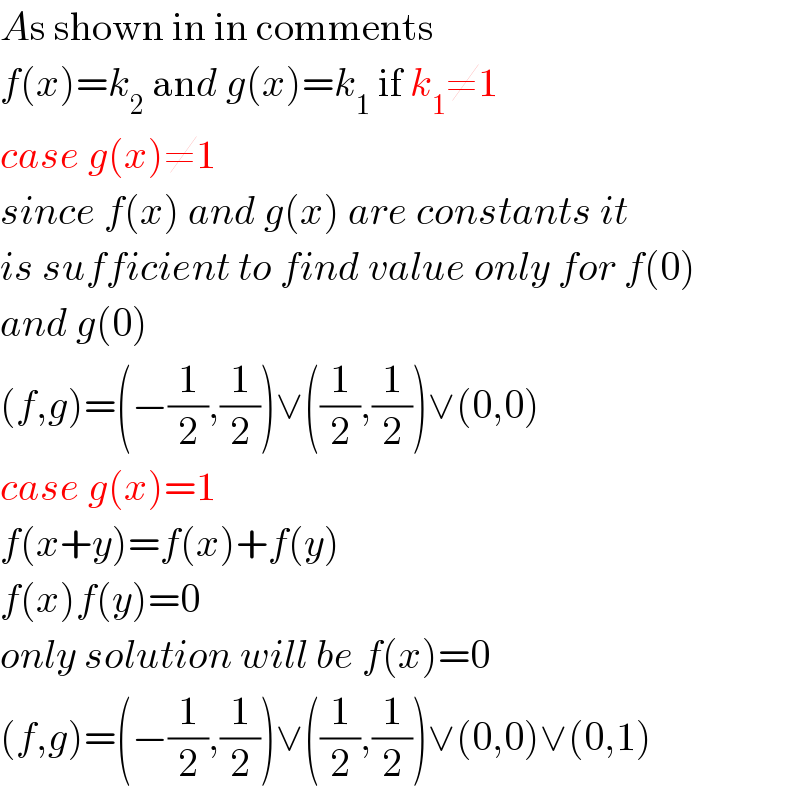
Question and Answers Forum
Previous in Relation and Functions Next in Relation and Functions
Question Number 1976 by 123456 last updated on 27/Oct/15
![f:R→R g:R→R f(x+y)=f(x)g(x)+f(y)g(y) g(x+y)=f(x)f(y)+g(x)g(y) [f(x)]^2 +[g(x)]^2 =? [f(x)+g(y)][g(x)+f(y)]=?? f(x)=??? g(x)=????](Q1976.png)
Commented by prakash jain last updated on 27/Oct/15
![x=y=0 f(0)=2f(0)g(0)⇒f(0)=0 or g(0)=(1/2) g(0)=f^2 (0)+g^2 (0) Four solution for f(0), g(0) f(0)=0, g(0)=0 f(0)=0, g(0)=1.......(A) f(0)=(1/2), g(0)=(1/2), f(0)=−(1/2), g(0)=(1/2)......(B) y=0 f(x)=f(x)g(x)+f(0)g(0) f(x)[1−g(x)]=f(0)g(0) f(x)=((f(0)g(0))/(1−g(x)))........(1) g(x)=f(x)f(0)+g(x)g(0) subtitute f(x) from 1 above g(x)=((f(0)g(0))/(1−g(x)))+g(x)f(0) .....(2) ⇒g(x)=k_1 (constant) if g(x) is not constant then g(x)≠1 and (2) can only be solved with constant g(x) values. If g(x)=k_1 ⇒f(x)=k_2 continued in answer](Q1983.png)
Commented by Rasheed Soomro last updated on 28/Oct/15

Answered by Rasheed Soomro last updated on 27/Oct/15
![f:R→R g:R→R f(x+y)=f(x)g(x)+f(y)g(y).........(1) g(x+y)=f(x)f(y)+g(x)g(y)..........(2) [f(x)]^2 +[g(x)]^2 =? [f(x)+g(y)][g(x)+f(y)]=?? f(x)=??? g(x)=???? −−−−−−−−−−−−−−−−−−− Let y=x,substituting in (1) and (2) f(2x)=2f(x) g(x)........................(3) g(2x)=[f(x)]^2 +[g(x)]^2 ...................(4) From (3) g(x)=((f(2x))/(2f(x))) ∴ g(2x)=((f(4x))/(2f(2x))) Substituting values of g(x) and g(2x) in (4): ((f(4x))/(2f(2x)))=[f(x)]^2 +[((f(2x))/(2f(x)))]^2 ((f(4x))/(2f(2x)))=[f(x)]^2 +(([f(2x)]^2 )/(4[f(x)]^2 )) Multiplying by 4f(2x)[f(x)]^2 to b. s. 2f(4x)[f(x)]^2 =4f(2x)[f(x)]^4 +[f(2x)]^3 Too complicatdd ∗∗∗ Also from (3) f(x)=((f(2x))/(2g(x))) Substituting in (4) g(2x)=[((f(2x))/(2g(x)))]^2 +[g(x)]^2 g(2x)=(([f(2x)]^2 )/(4[g(x)]^2 ))+[g(x)]^2 4g(2x)[g(x)]^2 =[f(2x)]^2 +4[g(x)]^4 Too complicated. Continue](Q1978.png)
Answered by prakash jain last updated on 27/Oct/15

